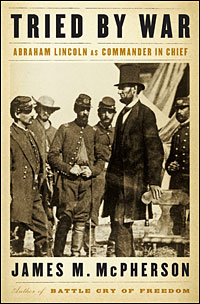“He [Abraham Lincoln] was not a quick study,” McPherson wrote, “but a thorough one.” According to James. M. McPherson, Lincoln was not a natural strategist as some have argued. He was not comfortable with having to make quick decisions, facing deadlines, and having to act decisively.
McPherson goes on to quote Lincoln, “I am never easy when I am handling a thought, till I have bounded it North, and bounded it South, and bounded it East, and bounded it West.”
It’s astonishing to me that Lincoln could be described as, well, slow. Maybe we should call him, “special.” When faced with the calamitous G.W. Bush as Commander-in-Chief, it seems almost facetious to even consider Lincoln as anything but deliberate and effective.
McPherson argues in Tried by War: Abraham Lincoln as Commander in Chief, that Lincoln had to practically invent the presidential role of “Commander-in-Chief” as there were virtually no historical examples for him to follow. Yet, though he was essentially creating a policy in time of war for all future presidents, McPherson seems content to nonetheless label Abe as slow. Perhaps a ploy to sell some books?
Don’t get me wrong, I enjoy James M. McPherson and have a lot of respect for him. I always want to get his latest book, which seem to hit the presses about every other year.
 Tried by War is timely and offers a fresh look at the role of the executive branch in time of war and the origins of the Commander-in-Chief role that we see today certainly owes its authority to Lincoln.
Tried by War is timely and offers a fresh look at the role of the executive branch in time of war and the origins of the Commander-in-Chief role that we see today certainly owes its authority to Lincoln.
Tried By War — Abraham Lincoln as Commander in Chief
by James M. McPherson
ISBN #1594201919.
Penguin, 2008, $35, 329 pages.
James McPherson, a bestselling historian of the Civil War, illuminates how Lincoln worked with—and often against— his senior commanders to defeat the Confederacy and create the role of commander in chief as we know it.
Though Abraham Lincoln arrived at the White House with no previous military experience (apart from a couple of months spent soldiering in 1832), he quickly established himself as the greatest commander in chief in American history. James McPherson illuminates this often misunderstood and profoundly influential aspect of Lincoln’s legacy. In essence, Lincoln invented the idea of commander in chief, as neither the Constitution nor existing legislation specified how the president ought to declare war or dictate strategy. In fact, by assuming the powers we associate with the role of commander in chief, Lincoln often overstepped the narrow band of rights granted the president. Good thing too, because his strategic insight and will to fight changed the course of the war and saved the Union.
Instead of “slow,” a kind of buzzword for “stupid,” what McPherson, and other biographers of Lincoln note is that he was deliberate and thoughtful.
Lincoln didn’t make decisions, especially important ones, instinctively, or reflexively. In the debased political vocabulary of our day, he didn’t do “gutchecks” or think issues were “no-brainers.” He liked to think things through, and understand where today’s decision would lead tomorrow. Because Lincoln was able to think, it meant he was able to evolve and adapt his policies to changing conditions and new information. Because he wasn’t driven by focus groups, or poll numbers, he was able to maintain his focus.
IMO, President Bush’s troubles come not from a lack of intelligence, but because he(and not just him), and a lot of people in Washington, don’t take the time to think, but rather match up events to a preexisting ideology. Things are “no-brainers” if you only use your brain to check off points of agreement or disagreement with a set in concrete mental framework.
21st century politicians constantly flatter their constituents and snarl threats at the enemy du jour. 19th century politicians weren’t anymore high minded, but Lincoln could make a speech like the 2nd Inaugural Address, a tough minded statement like a cold slap in the face.
I suspect Chris misinterprets McPherson’s meaning when he wrote, ‘He [Abraham Lincoln] was not a quick study.” The statement need not have the negative connotation that Chris seems to take from it. Abraham Lincoln was not quick in his decisions, but sometimes painfully slow. It is good to allow him, even Mr. Lincoln, to be the man that he was. He was only a man, though one guided by truth. Some people are quick, but Abraham Lincoln was wise, gracious, and thorough when it came to thinking and applying truths.
Concerning more recent politicians: I believe many do not take the time to think a matter through because they are afraid of this divine responsibility given to every leader. I suppose they are also afraid of the cost they will incur if they do: the cost to their careers for resisting powerful evils; the cost found in the painful awareness of their defiled consciences for participating, often times willfully, in so many immoral endeavors; and the cost of experiencing a true dearth of faith within them that the power of good is greater than the power of evil, that ultimately darkness cannot comprehend the light.
Abraham Lincoln believed that light would always prevail over darkness. For this reason, he pondered a matter in word until it became Truth and that particular Truth prevailed in his soul. This made him the fitting leader that this nation needed in its critical time of great struggle against darkness, which tried men’s souls.
May we learn the lessons that Abraham Lincoln taught by his own life and example. We desperately need them in our day.
I might add that the cost on not fulfilling the responsibility described above is immeasurably greater than the cost of abdicating it.